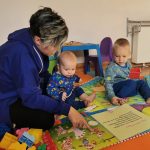Have you ever watched your little one pick-up a block, put it to their ear and babble into it? Your child is using this block as a phone, this is pretend or imaginative play! One of the many ways young children learn about the world around them is through pretend play, where they have the chance to take on different roles and act out different situations and scenarios. They also get to practice new skills over and over until they have perfected them. Pretend play has many benefits and children soon discover that they can become anyone or anything they want just by pretending!
Have you ever stopped to listen to a young child as they play with their toys or friends? You will hear words and phrases that you never realised they knew, sometimes you will even hear your own voice as children can do perfect imitations of mums, dads and teachers. Children learn new words through imaginary play and start to understand the power that words can have in re enacting a story or pretending to be someone else.
Pretend play also helps children develop their social and emotional skills. While it is normal for young children to see the world from their own perspective, as they grow older and play with friends, they start to develop an understanding of other peoples’ feelings. In pretend play, they can become different characters and walk in the shoes of others. This allows them to experience and feel what others do and they begin to understand the feelings of other people, helping them to develop empathy.
Participating in imaginary play situations with children allows parents to explore some confusing or scary life issues that their children may be experiencing. This can help them to come to terms with life events in a safe way. Pretend play is a normal way for children to figure out personal life events that happen around them, such as an illness or death of a family member or the separation or absence of a parent. It can also be used to prepare them for something in their future such as a stay in hospital, starting school or starting a new activity. Acting out what might happen with you is a safe way for your child to explore and prepare for different scenarios. It allows the parent to name and acknowledge the feelings associated with these situations and provide the necessary emotional scaffolding their child will need to succeed.
Children get lots of opportunity to solve problems in pretend play. Whether they are building a structure to play in, or figuring out who will play the different characters, children are learning to negotiate, cooperate and think flexibly with one another. They also learn and practice lots of different social skills such as having a conversation, taking turns, waiting and asking for help.
Imaginary play allows children to learn about themselves and their world. They are figuring out what they like and dislike, what their interests are, and what they can and can’t do. When they play different characters in play, children are making sense of what they see around them, of situations and of the roles people play in their lives. This is why a young child playing with their doll often mimics the role of carers in their lives through feeding, changing and holding the doll. Simple everyday objects you have at home will support your little one to think more creatively in their play. For example, a cardboard box can be a pirate ship, a car, a spaceship, or a house. It can be anything they need it to be. When engaging children’s imaginations the sky is the limit! Games and activities such as building forts under the kitchen table, going wild as cowboys and indians, playing doctors and nurses and drinking tea at teddy bears picnics have endless possibilities so go play pretend!
Top Tips to Encourage Pretend Play:
- Position yourself face-to-face with your baby, sing songs and rhymes like incy wincy spider or patty cake, inviting your baby to take part by pretending to be spider or the baker.
- Keep it simple.Don’t introduce too many pretend ideas at once. Children love repetition and learn by repeating, so they will likely enjoy practicing their pretend actions again and again.
- Create a prop box with objects to encourage your child to engage in pretend play. Include old clothes, shoes, scarves, hats, cardboard boxes, blankets, kitchen utensils, dolls and stuffed animals.
- Get involved and role model for your child. Role play up and coming events or situations that your child may be unsure of playing out what might happen. This will support your child to become more confident with new situations.
- Tell your favourite stories and invite your child to recreate the story with their own idea. Prompt ideas by asking questions like, ‘what happened next?’
- Join in the play. When you join in with your child in pretend play it gives them more opportunities to learn because it allows for more interaction and conversation within play.
This article was contributed ABC Start Right, a member of Parenting Limerick. Parenting Limerick is a network of parenting and family support organisations.




